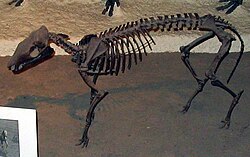Biology:Orohippus
| Orohippus | |
|---|---|

| |
| Skeleton of Orohippus pumillus at the Smithsonian Museum of Natural History. | |
| Scientific classification | |
| Domain: | Eukaryota |
| Kingdom: | Animalia |
| Phylum: | Chordata |
| Class: | Mammalia |
| Order: | Perissodactyla |
| Family: | Equidae |
| Genus: | †Orohippus Marsh, 1872 |
| Type species | |
| †Orohippus pumillus | |
| Species[2] | |
| |
Orohippus (from the Greek ὄρος óros, 'mountain' and ἵππος híppos, 'horse') is an extinct equid that lived in the Eocene (about 50 million years ago).
It is believed to have evolved from equids such as Eohippus, as the earliest evidence for Orohippus appears about 2 million years after the first appearance of Eohippus. The anatomical differences between the two are slight: they were the same size, but Orohippus had a slimmer body, a more elongated head, slimmer forelimbs and longer hind legs, all of which are characteristics of a good jumper. Its teeth were brachydont in height, but the development of flattened surfaces and shearing lophs on their molars suggests they were more a browser than a frugivore.[3] The outer toes of Eohippus are no longer present in Orohippus, hence on each forelimb there were four fingers (toes) and on each hind leg three toes.
Species of Orohippus has also been referred to Protorohippus.
See also
Notes
References
- MacFadden, B.J., 1998. Equidae. pp. 537–559 in C.M. Janis, K.M. Scott, and L.L. Jacobs (eds.) Evolution of Tertiary Mammals of North America Cambridge University Press, Cambridge.
- Orohippus, Index Fossils and the Tertiary
- The Evolution of the Horse
- National Center for Science Education
Wikidata ☰ Q679501 entry


